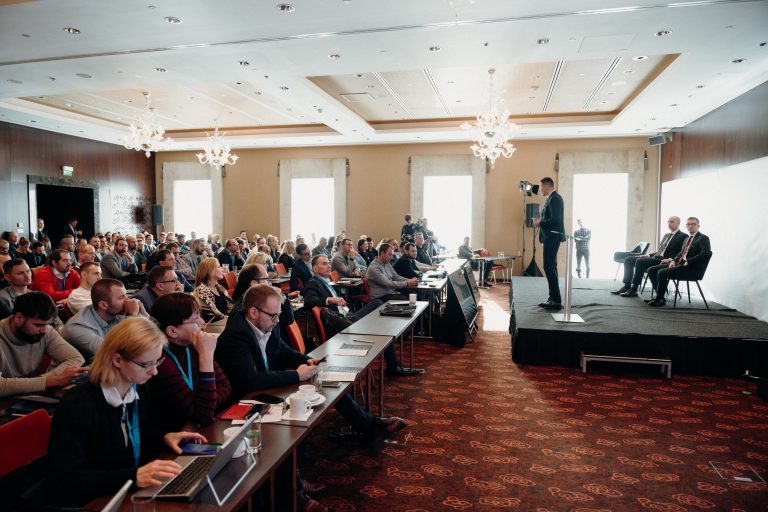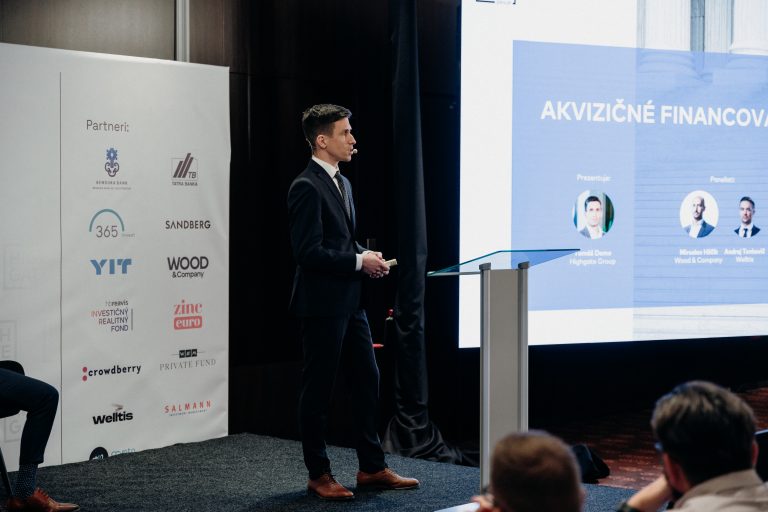
We welcomed more than 200 attendees to our largest conference to date, which focused on real estate financing through various regulatory and tax structures. We covered in detail real estate investment funds, from small Slovak funds to foreign funds operating in Slovakia, the establishment of foreign funds, bond financing and crowdfunding, various alternative structures and finally acquisition financing. In the individual topics, we combined our knowledge of law and tax together with the business perspective of panelists working in financial institutions or companies operating in the field of real estate financing.
For those who did not attend the conference, this article provides a brief overview of the topics we covered. At the same time, if you would like to watch the whole conference, or just some parts of it, we have video recordings of the conference available for you, which can be found at this link.
We opened the conference with a comprehensive discussion of different types of investment funds. When setting up a structure through investment funds, a number of factors have to be taken into account, hence their division mainly according to:
At the same time, not all types of investment funds are suitable or possible to use for real estate financing, and those that may have real estate in their portfolio consequently differ significantly in their specific parameters. Therefore, an initial comprehensive regulatory, legal and tax assessment of the above factors is crucial in the creation and establishment of investment funds.

The first panel was devoted to the so-called. Small investment funds. These are investment funds whose managers are limited by the maximum amount of assets they can manage. On the other hand, these investment funds are subject to very limited application of collective investment legislation, do not have a statutory investment policy (so they can invest in real estate) and are primarily aimed at professional investors and, to a limited extent, qualified investors.

The following factors play a key role in the distribution of small investment funds that invest in real estate:
Small investment funds can be set up as a variety of companies or cooperatives. At the same time, only an investment fund can take the legal form of a company limited by shares with a variable share capital (SICAV). This is a flexible legal form which is adapted to the needs of collective investment. Only a small investment fund set up as a SICAV can create sub-funds as accountably separate parts of the assets with different investment strategies.

The second panel focused on various alternative forms of raising capital from investors and investing in foreign real estate. The first topic was defining the boundaries of collective investment, i.e. answering when a particular business model constitutes a fund and when it is a legal structure without any permission from the NBS. When analysing a particular business model from a collective investment perspective, it is necessary to assess whether this business model:
Crowdunfing is a relatively still new regulation that makes it possible to connect investors on the one hand and entrepreneurs seeking funding for their projects on the other. The Crowdfunding Regulation aims to facilitate financing, especially for small and medium-sized enterprises, for which, for example, bond financing with a prospectus may be too costly. At the same time, crowdfunding platforms, as online platforms, are widely accessible to a large range of investors, including retail, and thus allow project owners to find funding, either through loans or by placing the securities they issue on that platform.

Thus, for example, a crowdfunding platform allows a developer to issue bonds (only up to a certain amount) in order to build a specific development project. Bonds can of course also be offered outside the crowdfunding platform, while the issuance of bonds represents a standard traditional method of financing, which is widely used in Slovakia and by developers. The legal regulation of bond issues is very flexible, which gives issuers a lot of room to set the individual parameters of the bonds according to their needs, starting with the way of calculating the yield, setting the rules for early maturity of the issue, the period during which the bonds will be issued, or their subordination to bank financing. At the same time, when financing real estate through bonds, an interesting institute is the security agent, in whose favour, as an agent of the bondholders, the bonds can be secured by the real estate.
Acquiring real estate outside the Slovak Republic can be an interesting investment opportunity. For investment structures that allow Slovak investors to make such investments, taxes are one of the most crucial parameters. Setting up the structure in such a way that it can be competitive for investors with other “domestic” investment products is a very complex matter, taking into account in particular the existing risk of double taxation.


The third panel, which also included two panelists from Slovak asset management companies, was devoted to larger investment funds, i.e. funds whose establishment and operation in Slovakia requires the permission of the NBS. The venture capital fund or “EuVECA” is primarily intended for investments in the so-called “EuVECA”. However, with a relatively broadly defined investment policy, it is possible under certain circumstances for such a fund to invest, for example, in companies owning real estate. While such a fund can also be established by a registered manager, in order to use the EuVECA designation, a number of requirements that are normally required (of course to a greater extent) for licensed management companies must be met, such as qualification requirements for persons managing venture capital funds, prudential requirements for the manager, and a number of internal policies. Not forgetting the correct tax set-up.
EuVECA and ELTIFs have the advantage that they can be distributed across the EU to a wider range of investors than other AIFMD alternative investment funds. ELTIF is also the only alternative investment fund that can be offered to retail investors throughout the European Union. The investment policy of this fund is primarily focused on investments in long-term assets (including real estate). Although ELTIF is a closed-end fund, under certain conditions, investors may be allowed to redemption before the life of the fund expires.
Typical investment funds used by Slovak asset management companies to invest in real estate (which they also refer to as “real estate funds“) are qualified investor funds, which do not have a statutory investment policy, and then public special real estate funds, which may invest directly in real estate or in so-called real estate companies and must follow rules for limiting and spreading risk in their portfolio. If certain criteria are met, it is also possible to acquire a commercial company that may own real estate as part of the assets of a public special alternative investment fund. Both real estate funds and alternative investment funds can be offered in Slovakia and to the retail sector without a minimum investment amount limitation.
The fourth panel was devoted to foreign funds whose securities or holdings can be offered to Slovak investors. There are various motivations for the decision not to set up an investment fund that will be offered (to a large extent) to Slovak investors, ranging from the stability of the legal environment, the variability of structures that do not exist in Slovakia, for example, but also for reasons of a more robust infrastructure (many Slovak entrepreneurs set up, for example, SICAVs in the Czech Republic, which are managed by “external” management companies).

A big challenge for Slovak investors in setting up investment funds abroad (also) is their tax structuring. Adding to the complexity of this issue are the various legal and tax-transparent structures that need to be dealt with when disbursing income to Slovakia.
In terms of distribution, foreign alternative investment funds (including non-European alternative investment funds) can be offered in Slovakia to all types of investors, but the individual conditions for achieving such distribution will vary depending primarily on:

In the fifth and final panel, we addressed the topic of acquisition financing. In a broader sense, financing includes not only bank financing, but also the use of own funds, which have several specificities and limitations, and, for example, various alternative forms of foreign financing.


At the same time, different types of financing can be combined, in which case the potential regulatory aspects of such combinations also need to be considered.
Slovak law brings several specifics, resp. Legal restrictions related to the provision and subsequent repayment of own financing. This not only implies high demands for creative structuring of acquisition transactions using own funds, but also places on the statutory bodies the burden of responsibility for compliance with these rules and a common obligation to compensate for damages in the event of their breach. In particular, the following institutes serve to protect the company’s capital and its shareholders and creditors against transactions between the company and its related parties which are not market-standard:
If you are interested in the above topics and would like to learn more about them, you can find video recordings of the individual conference panels right here:
If you are interested in this topic, please do not hesitate to contact us.
Law & Tax
Tomas Demo
tomas.demo@highgate.sk
Accounting
Peter Šopinec
peter.sopinec@highgate.sk
Crypto
Peter Varga
peter.varga@highgate.sk
Highgate Law & Tax
Nivy Tower, Mlynské Nivy 5,
821 09 Bratislava
Slovak Republic
Highgate Accounting
Nivy Tower, Mlynské Nivy 5,
821 09 Bratislava
Slovak Republic
E-mail
info@highgate.sk
Are you interested in the services of Highgate
Group? Get in touch at
info@highgate.sk
Careers
Interested in working for Highgate
Group? Get in touch at
info@highgate.sk